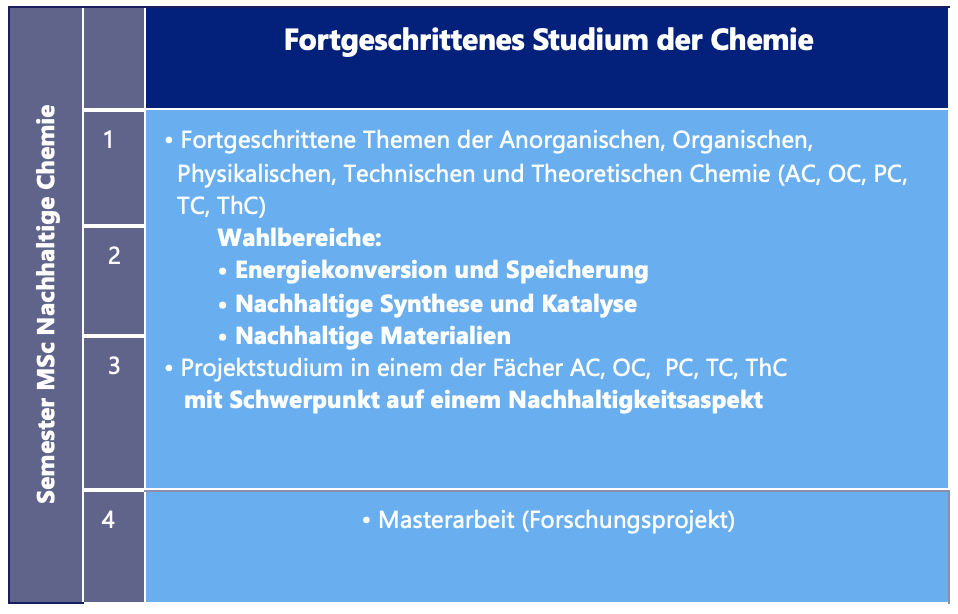Master in Sustainable Chemistry (MSc.)
The Master's degree programme (MSc) is divided into a compulsory and an elective area. In the compulsory section, in-depth chemistry topics are taught. These are applied in the elective area, which is characterised by special aspects of sustainability. A wide range of elective options are offered in the field of energy management, preparative chemistry or materials chemistry. After a research-oriented project programme, the course concludes with a Master's thesis.
- Advanced degree programme in chemistry.
- Wide range of elective options in the fields of Energy Conversion & Storage, Sustainable Synthesis & Catalysis, Sustainable Materials'

Study plan
(copy 1)
Sem. | Course | Module (part) | Type 1) | WL 3) | CP 4) |
1 | Advanced concepts of coordination chemistry | 1 (a) | V2 | 90 | 3 |
Organic Chemistry | 2 | V4 | 180 | 6 | |
Sustainable Processes | 5 | V4 | 180 | 6 | |
Preparative practical course | 6 | P10 | 240 | 8 | |
1 Compulsory elective module (winter semester) 2) | 180 | 6 | |||
Total | 870 | 29 | |||
2 | Solids and materials | 1 (b) | V2 | 90 | 3 |
Statistical Thermodynamics | 3 (a) | V4Ü1 | 120 | 4 | |
Surface and interfacial chemistry | 4 (a) | V4Ü1 | 120 | 4 | |
Instrumental practical course | 7 | P10 | 240 | 8 | |
1 Compulsory elective module (summer semester) 2) | 180 | 6 | |||
1 Compulsory elective module (summer semester) 2) | 180 | 6 | |||
Total | 930 | 31 | |||
3 | Computer chemistry | 4 (b) | V2 | 90 | 3 |
Spectroscopy | 3 (b) | V2 | 90 | 3 | |
Project studies | 8 | P14 | 360 | 12 | |
1 Compulsory elective module (winter semester) 2) | 180 | 6 | |||
1 compulsory elective module (winter semester) 2) | 180 | 6 | |||
Total | 900 | 30 | |||
4 | Master's thesis | 20 (a) | 720 | 24 | |
Oral defence | 20 (b) | 180 | 6 | ||
Total | 900 | 30 | |||
Module set-up
(copy 2)
Compulsory elective: Subject area A - Energy conversion and storage
No. | Module | Module Events | Type 1) | Sem. 2) | WL 3) | LP 4) |
9 | Chemical energy conversion and storage | (a) Photochemical energy conversion | V2 | winter semester | 90 | 6 |
(b) Electrochemical energy conversion | V2 | 90 | ||||
10 | Energy and environment | Energy and Environment | V4Ü2 | Summer semester | 180 | 6 |
11 | Spectroscopy in energy conversion | (a) Time-resolved spectroscopy | V2 | summer semester | 90 | 6 |
(b) Theoretical Spectroscopy | V2 | 90 | ||||
12 | Applied electrochemistry and electrochemical energy storage | (a) Applied electrochemistry | V2Ü1 | winter semester | 105 | 6 |
(b) Electrochemical energy storage | V2 | 75 |
Compulsory elective: Subject area B - Sustainable synthesis and catalysis
No. | Module | Module Events | Type 1) | Sem. 2) | WL 3) | LP 4) |
13 | Catalysis | (a) Homogeneous catalysis | V2 | winter semester | 90 | 6 |
(b) Heterogeneous catalysis | V2 | 90 | ||||
14 | Sustainable synthesis | (a) Renewable raw materials | V2 | winter semester | 90 | 6 |
(b) Organo- and biocatalysis | V2 | 90 | ||||
15 | Organic synthesis | (a) Retrosynthesis | V2 | summer semester | 105 | 6 |
(b) Modern Aspects of Synthetic Chemistry | V2 | 75 | ||||
16 | Structure elucidation | (a) Advanced NMR spectroscopy | V2 | winter term | 90 | 6 |
(b) X-ray crystallography & spectroscopy | V2 | 90 |
Compulsory elective: Subject area C - Sustainable materials
No. | Module | Module Events | Type 1) | Sem. 2) | WL 3) | LP 4) |
17 | Sustainable polymer chemistry | (a) Sustainable polymer synthesis | V1 | summer semester | 40 | 6 |
(b) Supramolecular chemistry | V1 | 10 | ||||
(c) Polymer analytics | V2Ü1 | 100 | ||||
18 | Biochemistry and biomaterials | (a) Biochemistry | V2 | winter semester | 90 | 6 |
(b) Biointerfaces and nanobiomaterials | V2 | 90 | ||||
19 | Interface-dominated materials and interfacial analysis | (a) Advanced methods in materials and interface analysis | V2 | winter semester | 90 | 6 |
(b) Functional polymer materials | V2 | 90 |
1) V = Lecture, Ü = Exercise, S = Seminar, P = Practical, 2) Lecture offered in winter semester (WiSe) or summer semester (SoSe), 3) Workload in hours, 4) Credit points